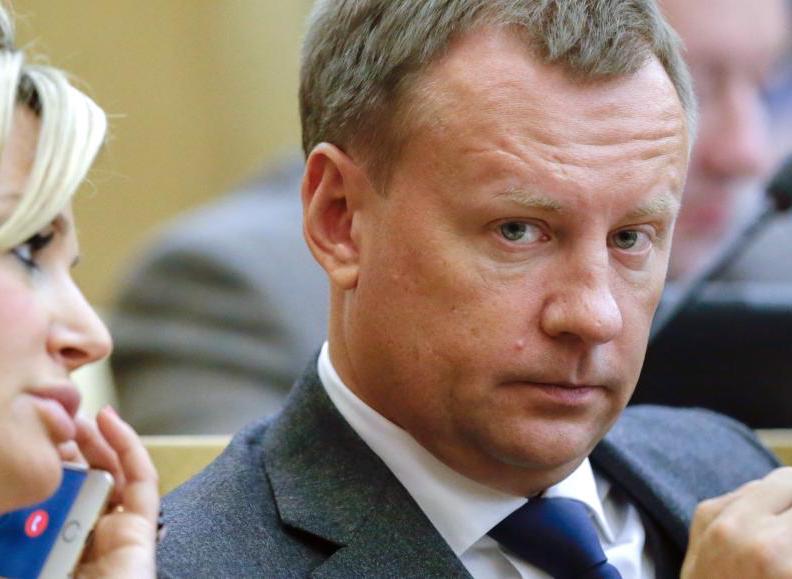Who Killed Denis Voronenkov?
In the heated propaganda war between Russia and the “West,” rationality is in short supply.

Denis Voronenkov, the late Russian politician, with his his wife, opera singer and parliamentarian Maria Maksakova. Anna Isakova / TASS
On March 23, the Russian politician Denis Voronenkov joined an uncoveted list. Slain on a busy street in Kiev, Voronenkov became the latest in a series of sensational murders of Russian opposition members, including journalist Anna Politkovskaya, lawyer Stanislav Markelov, politician Boris Nemtsov, and defected spy Alexander Litvinenko.
As in earlier cases, theories abound about who was behind Voronenkov’s assassination. Unfortunately, the conflicting versions that people have chosen to advance are more a reflection of their position in the ongoing propaganda war between Russia and the “West” than any sober assessment of the evidence.
Ukrainian president Petro Poroshenko quickly blamed Moscow for the murder, casting aspersions before any police investigation had even begun. European and American outlets have largely accepted this version. Russia, on the other hand, has dismissed the accusations as “absurd.” And Gennady Zyuganov, the leader of the Russian Communist Party, which counted Voronenkov as a member, says he believes that the Ukrainian security service, or possibly even the CIA, was responsible for the assassination.
Elected to the Duma in 2011 under the Communist Party banner, Voronenkov was a rather controversial figure whose career was marred by several corruption scandals. Together with his wife, opera singer Maria Maksakova — a parliamentarian for Putin’s United Russia — Voronenkov travelled in the circles of the cultural and political elite in Moscow and owned several luxury apartments and expensive cars. He was, despite his Communist Party membership, neither a leftist nor an opposition leader, but instead a wholesale supporter of Putin’s policies, including his annexation of Crimea.
But last fall, Voronenkov was accused of economic crimes, faced a prison sentence, and chose to flee to the Ukraine, where he was granted asylum and Ukrainian citizenship. After his defection, Voronenkov held several press conferences denouncing Putin and swearing allegiance to his new homeland. In the eyes of many Ukrainian right-wing extremists and nationalists, however, Voronenkov was an unreconstructed communist and a representative of the Russian elite. He received numerous death threats from right-wing extremists, often quite openly on social media.
When the perpetrator of Voronenkov’s murder was finally identified, it turned out that he was indeed a Ukrainian right-wing extremist. A member of the Ukrainian National Guard, the man had participated in a fascist volunteer battalion that was fighting separatists in east Ukraine.
Yet the Ukrainian authorities have stuck to blaming Russia for the murder — arguing the perpetrator was a Moscow agent who infiltrated the Ukrainian military — and President Poroshenko has promised that Russia will pay dearly. He’s threatened to break off diplomatic relations with Russia, which would make the ongoing peace negotiations even more difficult.
Voronenkov’s slaying comes at a particularly tumultuous time, with an escalating war in eastern Ukraine. Since January, heavy fighting has flared up again between Ukrainian troops and pro-Russian separatists, with many civilians caught in the crossfire. (The Organization for Security and Co-operation in Europe, an intergovernmental group, has blamed both sides for violating a ceasefire.)
In late January, ultra-nationalist soldiers from the Ukrainian volunteer battalions established an illegal blockade against two breakaway regions in eastern Ukraine, Donetsk and Luhansk, a move that heightened the conflict. Poroshenko at first condemned the siege — which dealt a major blow to an already economically weak country — and demanded that the nationalists withdraw. But Poroshenko’s government proved too weak to enforce such diktats. The nationalists rebuffed his demands and threatened to dissolve the parliament. Poroshenko was left with no choice but to accept the blockade, which he declared legal in mid-March.
Poroshenko faces a difficult dilemma. If he does not join in the loud nationalist rhetoric and escalate the military confrontation against the breakaway republics, he risks sparking a political crisis, perhaps even a coup. At the same time, many of Ukraine’s European allies have become more and more unhappy with Kiev. France and Germany have protested that Poroshenko imperiled the peace process when he legalized the blockade, and the International Monetary Fund has refused to send a final emergency loan because it sees the country as hopelessly fragmented.
The murder of Denis Voronenkov has further exacerbated these tensions, making any de-escalation of the conflict seemingly impossible.
Meanwhile, there’s little prospect of finding out the truth about who was behind Voronenkov’s assassination. For some it is obvious that Ukrainian Nazis were responsible. Others insist that the perpetrator was in fact a Russian agent.
In death, Voronenkov has become little more than a prop in the war of words between Russia and the “West.” And in that heated conflict, rationality is one of the first casualties.